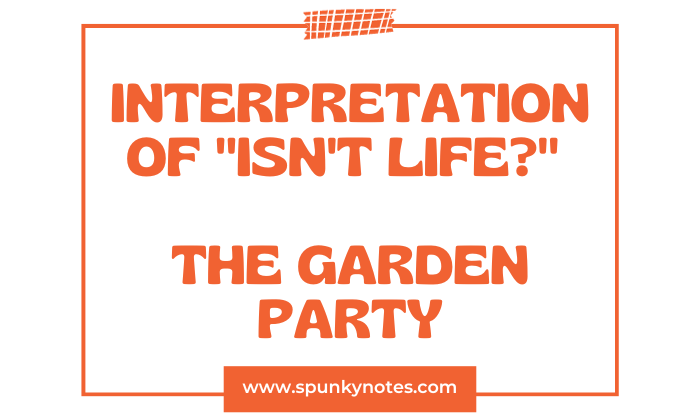
Q. What is the interpretation of the phrase “Isn’t life?” in the short story The Garden Party by Katherine Mansfield?
Introduction
In the story “The Garden Party” by Katherine Mansfield, the phrase “Is not life?” comes up at the end of the story.
Laura’s family is getting ready for a fancy garden party, and while Laura helps, she feels happy and amazed by life. However, then something sad happens—a neighbor dies. This makes Laura think about life differently.
In Katherine Mansfield’s “The Garden Party,” Laura’s reaction to the death of her neighbor, Mr. Scott, is one of shock, empathy, and a sense of moral duty.
When she learns about the tragic accident that led to Mr. Scott’s death, her initial reaction is to feel a sense of disbelief and horror. She is deeply affected by the news, which marks a significant moment in her personal growth and understanding of the world.
At first, Laura is still trying to figure out how to respond. She questions whether the garden party should be canceled out of respect for the deceased. She struggles with the idea of life going on as usual while such a tragedy has occurred nearby.
Her empathy for the Scott family and her desire to do something meaningful in response to the death highlight her emerging sensitivity to the suffering of others.
It leads to her decision to visit the Scotts’ home, where she witnesses the grief and poverty of the family. Laura’s reaction during the visit is a mix of compassion and discomfort.
She is moved by the sight of Mr. Scott’s body, and she feels a deep connection to the deceased despite never having known him personally. She is also disturbed by the contrast between her world’s opulence and the Scotts’ struggles.
In the end, Laura tries to explain this deep feeling to her brother, Laurie, but it is hard. Laurie understands without needing fancy words. The story does not end neatly; it leaves us with a question: “Isn’t life?”
“Isn’t Life”: A Reflection of Life’s Complexity
In the story’s context, the phrase “Isn’t life?” signifies a profound moment of realization and reflection. On one hand, it expresses astonishment at the stark contrast between the joyful garden party and the tragic accident nearby. On the other hand, it reflects an awareness of life’s multifaceted nature, where happiness and sorrow coexist.
This phrase is a symbol of the protagonist’s evolving perspective. It marks a turning point in her understanding of the world, signifying her transition from a sheltered and naive viewpoint to a more mature and experienced one.
This ambiguous phrase also highlights the story’s central theme of life’s complexities and the coexistence of beauty and tragedy.
In those final lines, we see what is happening in Laura’s heart. She is all emotional and tries to describe her feelings after the fancy garden party.
While returning, she talks to her brother, Laurie, but she cannot find the right words to spill it out. Laura’s phrase, “Isn’t life?” is not just a random saying. It is like a big mirror, reflecting how wild and beautiful life can be.
Ineffability of Profound Experiences
It is like life is this big mix of happy and sad, good and not-so-good, and Laura’s trying to capture all of that in just three simple words. However, Laura cannot quite put her finger on what she is feeling.
It is like she is trying to explain something super deep and meaningful, but it is so significant and unique that words are insufficient.
Laurie, the Emotional Sidekick
And then there is Laurie, her brother. He is like her emotional sidekick. Even though Laura cannot spill out precisely what she means, Laurie gets it.
He has tuned into her feelings without needing a significant explanation. They have this secret language of the heart and do not need fancy words to understand each other.
Open-Ended Conclusion
Mansfield is doing something extraordinary here. She is not tying up the story with a neat little bow. It is not like, “This happened, that happened, and everyone lived happily ever after.” Mansfield leaves it all open, like a door that’s just a little bit ajar.
Life’s Mix of Emotions
She wants the readers to think about what Laura is going through and what those two little words, “Isn’t life,” really mean. So, we are left with this feeling – a mix of emotions just like life itself.
There is joy in the fancy party, but then there is the sadness that hits when Laura thinks about something more significant than the party, like the ups and downs of life.
Mansfield’s Invitation to Reflect
It is like Mansfield says that life is big, messy, and beautiful. Think about this. Moreover, that is where she leaves us – thinking. The story is not neatly packaged with a bow on top.
“Isn’t Life?”: A Seed of Contemplation
It invites the readers to think about their connections with others. So, when you finish reading those last lines of “The Garden Party,” it is not just the end of a story. It starts your journey of thinking about life’s twists and turns and how we connect with the people around us.
Conclusion
The phrase “isn’t life” reflects Laura’s newfound understanding and struggle to reconcile these two disparate worlds. It underscores a moment of existential contemplation, where the beauty and tragedy of life intermingle.
This moment signifies a critical turning point in Laura’s character development, marking her transition from innocence to a more mature, albeit confused, understanding of life’s complexities.
Mansfield is not giving us all the answers; she is giving us a question to carry with us – “Isn’t life?” Moreover, that question is like a seed planted in our minds, waiting to grow into our understanding of life’s beautiful mess.

